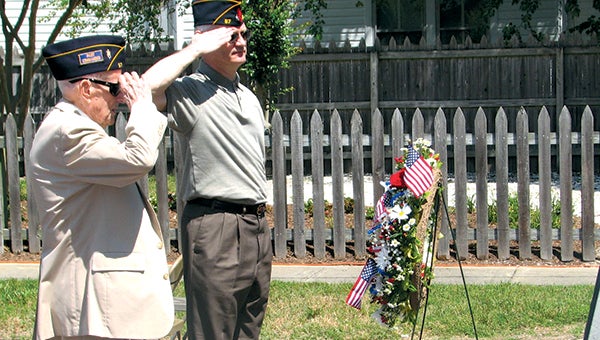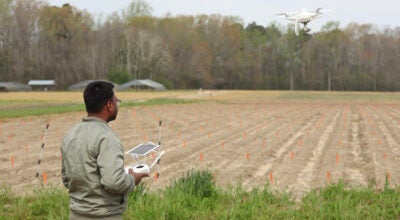Vietnam War remembered
Published 5:16 pm Monday, May 25, 2015

Kermit Kelley, a former Suffolk mayor, and Curtis Mackenzie, both members of the American Legion Post 57, salute after placing a wreath at one of the war memorials at Cedar Hill Cemetery during Monday morning’s ceremony.
An Army nurse who died on her shift at the 312th Evacuation Hospital in Chu Lai, Vietnam.
A private first class, just a few weeks shy of his 21st birthday, who threw himself onto a grenade to save a fellow Marine.
A brigadier general who visited a unit that had taken heavy casualties in combat earlier in the day, and became a casualty himself from a sniper’s bullet.
They were only three of the more than 58,000 American casualties of the Vietnam War, which officially started 50 years ago this year. U.S. Army Col. Stephanie Lewis told their stories during her speech at the American Legion Norman R. Matthews Post 57’s annual Memorial Day recognition at Cedar Hill Cemetery.
“We should take the time to reflect on the sacrifices of our soldiers, sailors, Air Force, Marines and Coast Guardsmen,” Lewis said.
Now serving at the Joint Chiefs of Staff in North Suffolk, Lewis has been in the Army for 26 years. She has deployed to Somalia, Haiti and Kuwait and earned the Meritorious Service Medal.
First Lt. Sharon Lane was the nurse who died in the rocket attack on June 8, 1969, at the 312th Evacuation Hospital, while she worked on the Vietnam Ward. One other person was killed, and 27 civilians and military personnel were wounded.
“Most (nurses) didn’t last long in the Vietnam Ward,” Lewis said. “They found it difficult to nurse the very people that that were trying to kill them, and to see the suffering of the children.”
But Lane loved her nursing work and even picked up extra shifts in the Intensive Care Unit’s surgery room, where she helped operate on the most mortally wounded of American soldiers.
She was stationed there for only eight weeks before her death, “yet she left an indelible mark on those she served with,” Lewis said.
Pfc. Robert Jenkins was posthumously awarded the Congressional Medal of Honor for his selfless act, which took place on March 5, 1969. His 12-man reconnaissance team was assaulted near Fire Support Base Argonne, and a hand grenade landed near Jenkins and another Marine.
Jenkins pushed the man to the ground and shielded his body, thus absorbing the full impact of the blast.
His family had John 15:13 inscribed on his headstone: “Greater love hath no man than this, that a man lay down his life for his friends.”
Gen. Bill Bond “stepped out of his chopper and into eternity” on April 1, 1970, Lewis said.
Never one to lead from behind, Bond, commander of the 199th Light Infantry Brigade, was a frequent visitor to the front lines. That’s what he was doing when he was shot, becoming the first U.S. general killed in ground fighting in Vietnam.
“Gen. Bond understood that a soldier that’s well led can achieve anything.”
While Lewis’ speech focused on the Vietnam War because of the anniversary, the ceremony also included the placement of memorial wreaths at each of the war memorials in the cemetery — Revolutionary War, Civil War, Spanish-American War, World War I, World War II, Korean and Vietnam. Wreaths also were taken to the Albert G. Horton Jr. Memorial Veterans Cemetery after the service.






